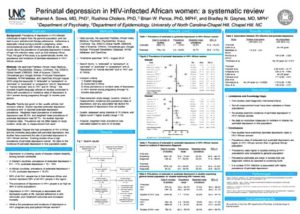Resident Research Track
 Led by Dr. Brad Gaynes, the Resident Research Track provides the formative basis for an academic and research-oriented career, offering in-depth opportunities for didactic and experiential training in research methodology and academic career development. Many residents who participate in this program first-author papers, present posters at conferences, speak at Grand Rounds, and give talks at professional meetings, all before they even complete their residency.
Led by Dr. Brad Gaynes, the Resident Research Track provides the formative basis for an academic and research-oriented career, offering in-depth opportunities for didactic and experiential training in research methodology and academic career development. Many residents who participate in this program first-author papers, present posters at conferences, speak at Grand Rounds, and give talks at professional meetings, all before they even complete their residency.
This elective track (applications are accepted midway through the PGY-1 training year) is designed to provide progressive and intensive research training and experience to residents. Training opportunities are available in a wide range of clinical and neuroscientific disciplines, including:
- descriptive phenomenology
- clinical psychpharmacology
- epidemiologic & molecular genetics
- behavioral & molecular pharmacology
- molecular & developmental neurobiology
- epidemiology
- neuropsychology
- neurophysiology
- neuroimaging
PGY-1
Interns interested in the Resident Research Track apply during the middle of their PGY-1 year, and are encouraged to meet with Dr. Gaynes to discuss their areas of interest, training goals, and identify prospective mentors. The application consists of a one page proposal statement identifying the applicant’s research mentor and detailing specific research goals and plans. The number of residents admitted each year varies on interest and availability.
PGY-2
Residents selected for the Resident Research Track have at least 1 day per week devoted to research and research training. The exact schedule will vary, depending on the availability of the resident and research mentor, as well as the requirements of the specific research being conducted. This protected time could include:
- participation/implementation of research protocols on clinical service rotations,
- development of an independent research project, or
- laboratory-based training experience.
Didactic activities could include:
- directed readings and tutorials,
- supervisory meetings with their research mentor, and
- participation in lab meetings.
In addition, the resident will have the opportunity to take the NIH Human Subjects Training Course, participate in journal clubs, and attend seminars in Alcohol & Substance Abuse, Schizophrenia, Autism, Neuroimaging, Women’s Mood Disorders, Eating Disorder research, and others.
PGY-3
Residents typically spend a minimum of ½ day per week devoted to continuing their research activities. In addition, they can elect to serve as a research psychiatrist in the The North Carolina Psychiatric Research Center. This research center is located at Central Regional Hospital and is the principal clinical site for Experimental Therapeutics Research associated with the UNC Mental Health Clinical Research Center.
Other clinical research options include rotations through:
- the Early Psychosis Research Program of the STEP Clinic,
- the Pediatric Psychosis Research Program,
- the Mood Disorders Research Program, and
- the Eating Disorders Research Program.
PGY-4
PGY-4 residents in the Resident Research Track may devote up to 80% of their year to research and research training. They will continue to work with their mentor on their research project and in addition, will receive instruction in scientific scholarship, writing for professional journals, and fundraising/grantsmanship. Residents will be guided to write and submit papers to scientific journals and develop a grant application.
